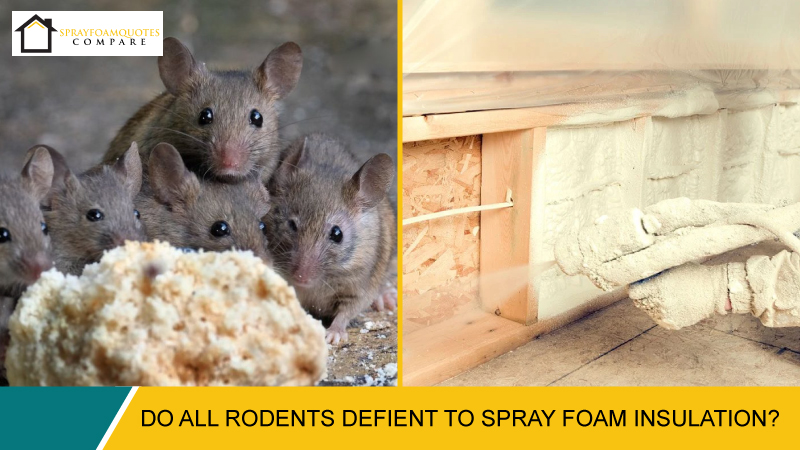When it comes to rodents, prevention is crucial. Stopping them from going into the house is considerably easier than having them leave. Spray foam insulation accomplishes the purpose of prevention by efficiently sealing the home. Spray foam acts as a deterrent. It won’t work if the area is already infested with rodents. While completely insulating the house from top to bottom may well be impractical, sealing areas such as the loft, garage, and portions of the floor will make a significant difference. Rodents are generally not drawn to spray foam since it does not resemble food. Unlike other types of insulation that are more easily penetrable, it is not something they will chew on or consume.
Spray foam is, after all, an insulating material. However, one of the advantages is that it efficiently seals any room in a home or building facility, keeping rodents and vermin out. Most of the advantages of spray foam insulation for homeowners are increased housing insulation, better humidity control, and contains additional. Of course, having a sealed enclosure prevents rodents and bugs from entering is an added benefit. Overall, spray foam insulation is an endeavor that is best left to professionals. This will provide the finest possible installation and long-term results.
What distinguishes spray foam insulation from other types of insulation?
It has revolutionized the way mice, rats, and other rodents are stopped in their tracks. Conventional and less modern insulation materials, including fiberglass and polyurethane, do not have these rodent-proof qualities. Traditional forms of insulation, unlike Icynene® spray foam, do not produce an airtight barrier, leaving spaces wide enough for rodents to enter. Fiberglass and polystyrene also serve as a source of food for pests. Because mice and rats may chew through these conventional insulation materials, their insulating characteristics will gradually deteriorate over time. This implies that heat loss will increase, and energy expenses will rise as a result!
Why should you use spray foam insulation to keep rodents out?
For almost all of the insulation projects, spray foam insulation quotes compare uses Icynene spray foam, which is a 100% mouse, rat, and rodent-proof spray foam insulation. Spray foam insulation is rodent-proof from the start since it is airtight from the start, and it stays that way for years. This is due to the fact that spray foam insulation somehow doesn’t degrade like other types of insulation, remaining totally intact and free of sagging and gaps. Our rat and mouse-proof expanding foam covers every nook and corner in your home’s roof or attic, leaving no gaps for vermin to get through.
We must handle the most common entry points for pests such as rats, bats, and even bugs. The basement space, rim ceiling, and gaps in the attic are the places where more air leaks occur. These pests will run down the length of a structure till they find a spot when they are searching for a nice, comfy spot to stay. Essentially, the small rodent is hunting for a way out of your home. If it’s freezing outside and your house is seeping heat, that mouse will find the leak and mistake it for a warm invitation inside. Insulating your property with foam insulation will not address the problem.
Mice Control Spray Foam
First of all, you must explain the current situation. An exterminator is your best bet if you have a significant infestation. So you shouldn’t have to stress about it, get every one of those vermin out of your house. Then, especially if you detect gaps in your attic or larger gaps in your foundation, you’ll want to close up any areas where these rodents could get into your home. You would like to take proper care of such difficulties straight away. Rodents and pests have no food value in spray foam. When it comes to bugs, the wonderful thing about spray foam is that it does assist.
Is it Possible for Mice to Pass through Spray Foam?
If the creatures have already taken up residence in your home, it is better to employ an exterminator to issue them with an eviction order before installing foam insulation. Spray foam insulation is not a repellent in any form. Rodents proof, moths, vermin, and other insects can chew their way across into your home by chewing through wood.
They can gnaw through the foam, of course. Foam insulation inside the house will help keep pests away because it acts as a second line of defense, preventing the air leaks that pests are hunting for. Browse out the Learning Center of our website for information further about foam insulation and many of its hidden benefits.
It’s not uncommon to find rodents and other vermin in any home, whether new or old. The chilly weather drives rats into hot cavities such as the loft and roof in the winter. While mice may invade other regions of the building, attics provide the ideal environment for them to thrive. Rodents can be damaging even when they are not in a poisoned environment. Wires, hard foam insulation, or even fiberglass batt are all chewed apart by them. But worse, the prevalence of mice in any portion of the house could make it difficult to sell.
Rodent proof your home whilst saving up to 50% on your energy bills with residential spray foam insulation. Request a callback and receive a free Icynene® spray foam quote today.


